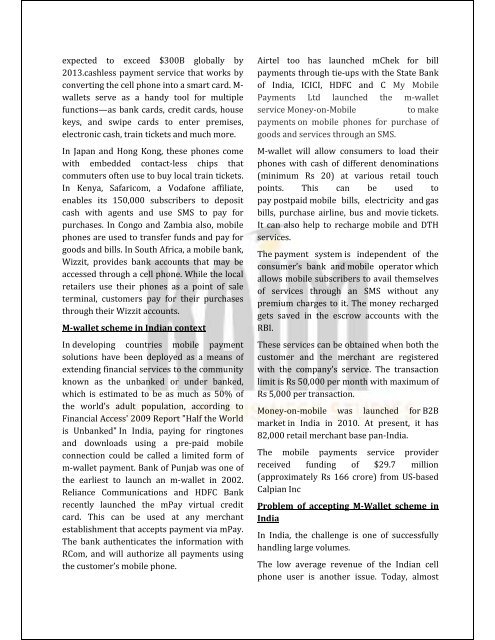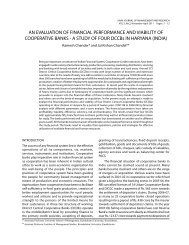Newsletter August 2012 - KAIM India School of Management
Newsletter August 2012 - KAIM India School of Management
Newsletter August 2012 - KAIM India School of Management
Create successful ePaper yourself
Turn your PDF publications into a flip-book with our unique Google optimized e-Paper software.
expected to exceed $300B globally by<br />
2013.cashless payment service that works by<br />
converting the cell phone into a smart card. M‐<br />
wallets serve as a handy tool for multiple<br />
functions—as bank cards, credit cards, house<br />
keys, and swipe cards to enter premises,<br />
electronic cash, train tickets and much more.<br />
In Japan and Hong Kong, these phones come<br />
with embedded contact‐less chips that<br />
commuters <strong>of</strong>ten use to buy local train tickets.<br />
In Kenya, Safaricom, a Vodafone affiliate,<br />
enables its 150,000 subscribers to deposit<br />
cash with agents and use SMS to pay for<br />
purchases. In Congo and Zambia also, mobile<br />
phones are used to transfer funds and pay for<br />
goods and bills. In South Africa, a mobile bank,<br />
Wizzit, provides bank accounts that may be<br />
accessed through a cell phone. While the local<br />
retailers use their phones as a point <strong>of</strong> sale<br />
terminal, customers pay for their purchases<br />
through their Wizzit accounts.<br />
Mwallet scheme in <strong>India</strong>n context<br />
In developing countries mobile payment<br />
solutions have been deployed as a means <strong>of</strong><br />
extending financial services to the community<br />
known as the unbanked or under banked,<br />
which is estimated to be as much as 50% <strong>of</strong><br />
the world's adult population, according to<br />
Financial Access' 2009 Report "Half the World<br />
is Unbanked" In <strong>India</strong>, paying for ringtones<br />
and downloads using a pre‐paid mobile<br />
connection could be called a limited form <strong>of</strong><br />
m‐wallet payment. Bank <strong>of</strong> Punjab was one <strong>of</strong><br />
the earliest to launch an m‐wallet in 2002.<br />
Reliance Communications and HDFC Bank<br />
recently launched the mPay virtual credit<br />
card. This can be used at any merchant<br />
establishment that accepts payment via mPay.<br />
The bank authenticates the information with<br />
RCom, and will authorize all payments using<br />
the customer’s mobile phone.<br />
Airtel too has launched mChek for bill<br />
payments through tie‐ups with the State Bank<br />
<strong>of</strong> <strong>India</strong>, ICICI, HDFC and C My Mobile<br />
Payments Ltd launched the m‐wallet<br />
service Money‐on‐Mobile<br />
to make<br />
payments on mobile phones for purchase <strong>of</strong><br />
goods and services through an SMS.<br />
M‐wallet will allow consumers to load their<br />
phones with cash <strong>of</strong> different denominations<br />
(minimum Rs 20) at various retail touch<br />
points. This can be used to<br />
pay postpaid mobile bills, electricity and gas<br />
bills, purchase airline, bus and movie tickets.<br />
It can also help to recharge mobile and DTH<br />
services.<br />
The payment system is independent <strong>of</strong> the<br />
consumer’s bank and mobile operator which<br />
allows mobile subscribers to avail themselves<br />
<strong>of</strong> services through an SMS without any<br />
premium charges to it. The money recharged<br />
gets saved in the escrow accounts with the<br />
RBI.<br />
These services can be obtained when both the<br />
customer and the merchant are registered<br />
with the company’s service. The transaction<br />
limit is Rs 50,000 per month with maximum <strong>of</strong><br />
Rs 5,000 per transaction.<br />
Money‐on‐mobile was launched for B2B<br />
market in <strong>India</strong> in 2010. At present, it has<br />
82,000 retail merchant base pan‐<strong>India</strong>.<br />
The mobile payments service provider<br />
received funding <strong>of</strong> $29.7 million<br />
(approximately Rs 166 crore) from US‐based<br />
Calpian Inc<br />
Problem <strong>of</strong> accepting MWallet scheme in<br />
<strong>India</strong><br />
In <strong>India</strong>, the challenge is one <strong>of</strong> successfully<br />
handling large volumes.<br />
The low average revenue <strong>of</strong> the <strong>India</strong>n cell<br />
phone user is another issue. Today, almost




